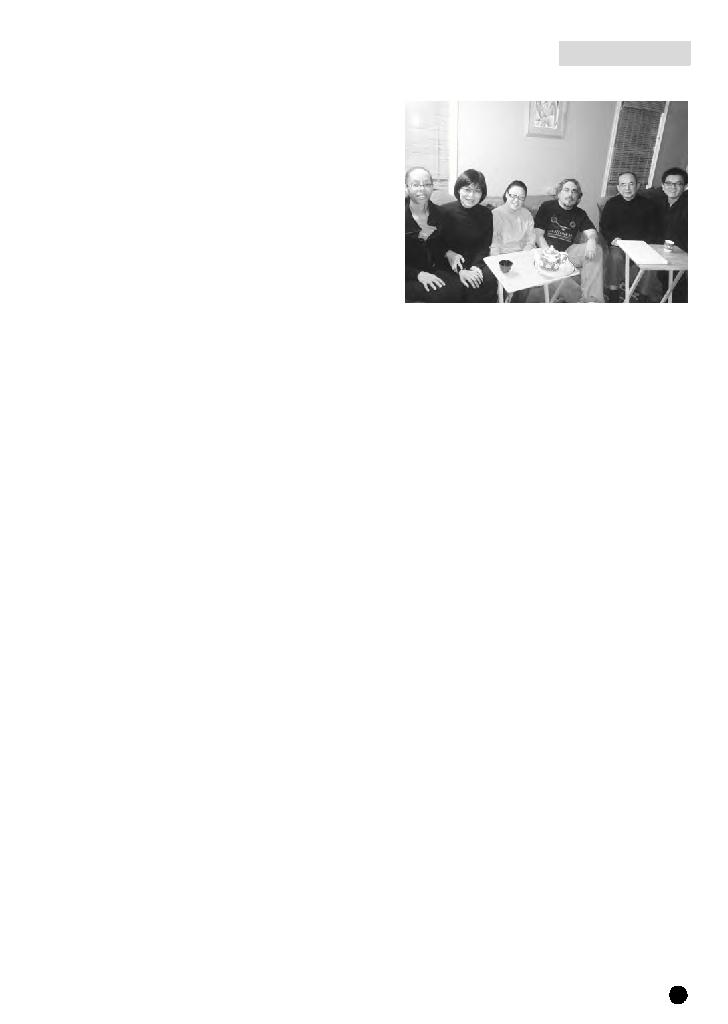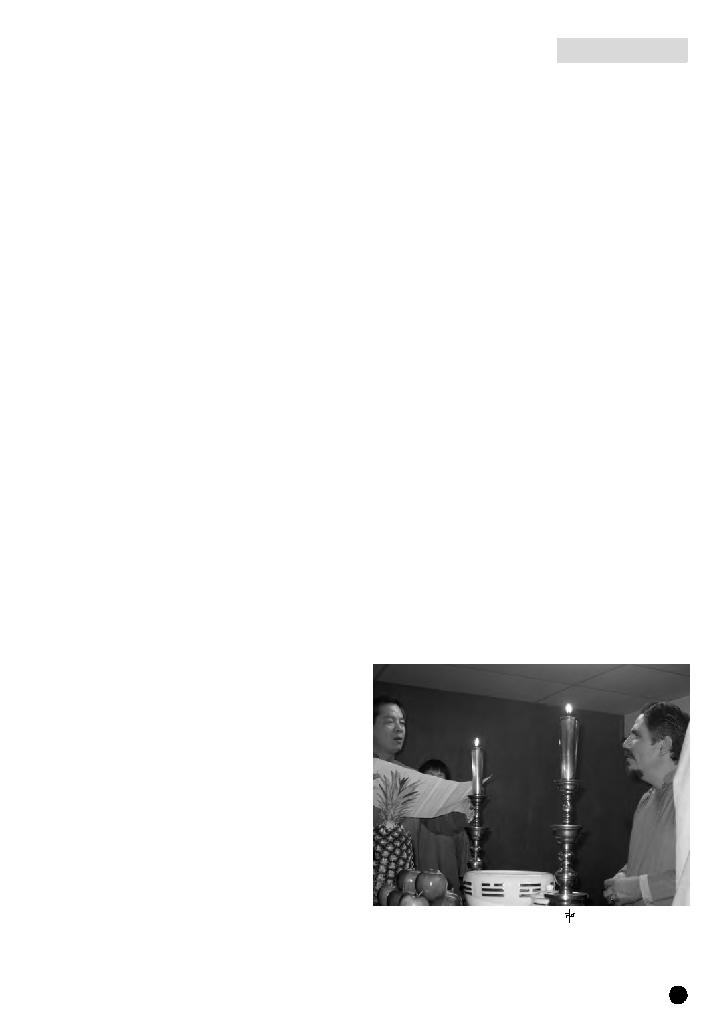pg_0001
20
基礎雜誌 301 期
If the sovereign can hold on to this
All things can transform themselves
-Tao Te Ching 37.1
Sometimes, Doing Nothing Is
Doing Something
◎
Michael Domzalski, Zhong Shu Temple, Michigan
(Tan Chu, Detroit Home Temple)
The Tao is constant in nonaction
Yet there is nothing it does not do
I was teaching in Los Angeles when I received Tao at the Great Tao Foundation
of America in 2002. I had been attending the temple classes for several months
before deciding to receive Tao. My teacher in the English Class was so well versed
in the teachings of Tao that he simplified its mysteries, which I quickly learned.
Then, I applied these lessons to my own teaching methods. It was about a week
after receiving Tao that I taught my fi rst Tao lesson in my special education class…
I was called to the assistant principal’s offi ce fi rst thing on a Monday morning
early in the school year, something that students, and teachers, alike, dread. I
feared the worst, and the worst was what was presented to me while sitting before
the second in command of my school. Pedro Gonzales (not his real name), a fi fth
grader, was going to be placed in my special education classroom for students with
learning disabilities on Thursday. I left her office fearful of what this student will
bring to my room, as I normally felt whenever a new student, with a history of
severe behavior problems was coming to my class. Yet, another feeling-though not
readily recognizable but seemingly positive-crept into my mind.
pg_0002
2014 年 1 月
21
有時看似無為
然其效用卻是無不為
◎
中譯 美國密西根忠恕道院 詹明哲
編按:筆者董麥克壇主(Michael Domzalski)西元 2002 年於美國洛杉磯全真道院求道,由
洛杉磯全真道院點傳師及前賢們慈悲成全開壇,為底特律家庭
堂壇主。目前定居
於密西根底特律,任職特殊教育老師,並於美國密西根忠恕道院參班與護持。
...... h ........i.........c.....c
.....e.
後學於西元 2002 年在美國洛杉磯全真道院求道,當時在學校教書。決定求
道前,後學已在道院參班好幾個月了。英文班的老師遣詞用字簡潔明瞭,能將深
奧的經文轉化為淺顯的文字,讓後學很快就能吸收。之後,後學將參班時所學的
精義,運用在自己的教學上。求道後約一個禮拜,後學為特教班學生上了第一堂
「道」的課……
開學後沒多久的一個週一早上,後學到校後,就被召到助理校長的辦公室
──遇到這種情況不僅是學生,連老師都會感覺很不安。坐在學校第二號人物的
面前時,後學內心盤算著最糟糕的狀況。果然有件事情極為棘手,岡沛卓(假名)
是一位五年級的學生,本週四將轉到後學這一班──特別為有學習障礙的學生所
設立的「特教班」。後學帶著憂慮的心情離開助理校長辦公室,就如平常一樣,
心想著當有嚴重行為偏差背景的新學生來班上時,將會帶來什麼影響呢?同時,
另一種還無法辨認出來的感覺,卻亦無聲無息地銘記在心。
pg_0003
22
基礎雜誌 301 期
Writing Gathering Field
文 薈 篇
On the way back to my class, I reflected on the conversation with my superior.
Pedro Gonzales. Wasn’t he the one who does not complete his school work,
routinely dumps the contents of his desk on the floor, and throws books, and pencils
at other students, and his teacher.
Yes, replied the assistant principal.
Pedro Gonzales. Wasn’t he the one that hit his teacher on the first day of
school.
Yes, the assistant principal teacher replied.
Pedro Gonzales. Wasn’t he the one who kicked his own mother in the office last
week when she came to pick him up from school because he was behaving so badly
in class that he had to be sent home that day.
Yes, the assistant principal replied,
again.
Terrific.
She told me that since I had a background in dealing with difficult students,
and that his mom requested that Pedro have a male teacher, my room was the best
place for him at this time. She also told me that she suspects that he does not have
learning problems; his behavior is the cause of his problems in class.
This Thursday.
Yes
.
What a way to start the week…
Usually, when a new student enters a class, there is a "honeymoon" period of
about a week to a month. During this time, the student is on their best behavior, and
does not display their well-documented behaviors. Well, there must have been a
cyclone in Maui because it only took Pedro three days to act out. The honeymoon
was over.
It started with him refusing to complete his morning reading assignment. I
try to teach my students discipline in my class. One first must complete all of their
work in the morning before they are allowed to go out to recess. Since Pedro did not
complete his work, I kept him inside for recess until he finished his work. He just
sat at his desk glaring at me. I reminded him that he could go out to recess after he
finished his work. He still refused to do any work. After all of the students, and my
teacher assistant left to go to recess, Pedro, true to his nature, tipped over his desk,
and he proceeded to throw his school supplies, and books around the room, and at
me. Since I was the only one in the room, I was his only target, and he was well
armed.
pg_0004
2014 年 1 月
23
海│外│來│鴻
回去班級的途中,後學回想了剛剛與助
理校長的對話。
「岡沛卓,是不是那個不做作業,時常
把桌上東西摔到地上,還拿書本、鉛筆丟其
他學生和老師的學生?」
「正是!」助理校長回答。
「岡沛卓,是不是那個在開學第一天就
▲
李寬仁點傳師 ( 左二 ) 及道親拜訪 Michael
Domzalski 壇主。
動手打老師的那位?」
「正是!」助理校長回答。
「岡沛卓,是不是那位上週因為在班上行為偏差、態度不佳,所以學校請他的
家長把他帶回家;而當他母親來辦公室接他時,他卻用腳踢他母親的那位學生?」
「正是那位學生!」助理校長又再回答。
何其有幸啊!
助理校長告訴後學,因為後學有應付難纏學生的經驗,加上他的母親也要求
岡沛卓能由男老師任教,所以後學的班級是目前最適合他的。助理校長同時也告
訴後學,她懷疑岡沛卓並無學習障礙,他在班上的問題主要是來自於他的行為。
「就從這週四開始?」
「是的!」
一週的開始竟是如此,真的有點……
通常新學生初到一個班上,都有一段蜜月期,大概是一週到一個月左右。在
那段時期學生表現得最好,以往不良紀錄的行為,並不會顯現出來。然而這情形
並不適用於岡沛卓。短暫的三天,蜜月期即宣告結束。
事情開始於岡沛卓拒絕完成他的晨讀作業。後學試著教導學生們班級的常規:
每位同學必須完成早上的指定作業後,才可以下課出去玩。因為岡沛卓沒有完成
他的功課,所以後學留他在教室內直到他完成為止。但他只坐在座位上盯著後學
看,後學提醒他:只要完成作業就可出去玩了。他仍然拒絕做任何功課。當所有
學生及後學的助手都離開以後,教室內只剩他和後學,他的本性就開始顯現出來。
他先把書桌推倒,然後開始拿他的文具、書本往教室內亂丟,甚至丟向後學。因
為教室內別無他人,後學是他的唯一目標,同時他也彈藥充足地面對我。
pg_0005
24
基礎雜誌 301 期
My first response was to duck and cover like I teach my students to do when
there is an earthquake while trying to subdue him at the same time, but something
held me in place near my desk about 15 feet away from Pedro-striking distance.
Something told me to do nothing (except dodge the occasional book, or crayon box
that came my way, of course). A calm feeling enveloped me, while chaos prevailed
in my classroom. I said nothing to him, and did not respond to his outrageous
behavior. I just stood there, and waited saying nothing, doing nothing.
When he ran out of ammunition, he looked up at me with a confused expression
for a moment, and then began to cry. I waited for another two minutes, saying
nothing, before approaching him. Instead of yelling at him for trashing my room,
and nearly knocking me out cold with his hard cover three hundred page math book
that narrowly missed my head, I approached him calmly, and asked him why he
was crying. He looked at his upended desk, and around the room at his books, and
school supplies that were scattered around the room, most of which were near my
desk. Then, he said he was in trouble. I asked him why was he in trouble. He told
me he was in trouble for making a mess, and for throwing things at me. I told him
that he didn’t hit me with anything, and that maybe he should practice his aim during
gym class so the next time he threw a tantrum like this he might have a better chance
of hitting me. A slight smile formed on his face through his tears.
I asked him what he could do to try to fix the problem that he just caused to
avoid getting in trouble. He said that he could clean up the mess, and say he was
sorry to me. I told him that was a good start. Further, I told him that no one else
has to know about what he just did as long as he promises not to do it again. He
complied with all of these conditions, and did not act out again in that manner
for the remaining six months that he spent in my class. Though, Pedro acted out
every now and then, it was not to same degree of his first performance. Each time
he misbehaved, I reacted calmly, and aided him in resolving his problems. In six
months’ time, his behavior improved dramatically, and he was placed back into
his regular education class. No further behavior problems occurred, and he left our
elementary school for middle school the next year as a regular education student.
Writing Gathering Field
文 薈 篇
pg_0006
2014 年 1 月
25
▲
Michael Domzalski 壇主的家庭
堂於 2009 年開壇
(左為美國洛杉磯全真道院郭詩永點傳師)。
後學的第一個反應是左閃右躲,趕緊找地方掩避,就如同教學生在地震發生
時所做的應變;同時也想辦法制止他。但有種力量讓後學維持在書桌旁,離他的
射程大約 15 英呎左右。有聲音告訴後學:「先不要有所行動。」當然,有時還是
要閃躲一下往臉上飛來的書本、蠟筆盒。雖然教室中一片混亂,但是一種出奇平
靜的感覺卻籠罩著後學。後學不出一言,對岡沛卓的憤怒行為亦不加理睬。後學
只是站在那裡,無言、無為。
當岡沛卓已無任何東西可用來攻擊時,他用一種迷惑的表情看了後學一會
兒,然後開始放聲大哭。後學讓他哭了大約 2 分鐘,不發一言,然後才開始走向
他。後學沒有大聲罵他把教室弄得一團髒亂,也沒有指責他所丟的那本 300 頁厚
的數學課本差點砸到後學的頭。只是平靜地走向他,問他為什麼哭。他看一看他
那張四腳朝天的桌子,散亂教室各處的書籍及文具用品,大部分是散落在後學的
桌子附近,然後他向後學說,他闖禍了。後學問他,到底闖了什麼禍?他說他把
教室弄成一團亂,還向後學丟東西。後學告訴他,他丟的東西並沒有打到我,他
或許應該在體育課時練習一下準頭,下次像這樣發脾氣時,丟中的機率可能比較
高。他含淚的臉上泛起了那麼一點微笑。
後學問岡沛卓,他可以做什麼事來將功抵過呢?他回答,他可以清理教室的
髒亂,並且向後學道歉。後學說,這是一個好的開始。同時後學也跟他說,只要
他答應不再犯,沒有人會知道他今天的作為。往後的 6 個月,他遵守班上秩序,
海│外│來│鴻
那天脫序的行為也從未再出現。雖然岡
沛卓還是會有行為偏差的時候,但是和
他第一次的表現相較之下,已經改善很
多了。每次他不守規矩時,後學心平氣
和地面對並引導他學習解決自身的問
題。在這 6 個月的期間,他的行為改變
非常大,而且後來他也回到正規班級,
再也沒有發生行為上的問題。隔年,他
從我們這所小學畢業,進入中學,成為
一位和其他小孩一樣的中學生。
pg_0007
26
基礎雜誌 301 期
Writing Gathering Field
文 薈 篇
Though the lessons in classroom management, and behavior modification that I
learned at the university aided me in helping Pedro improve his behavior, it was the
lessons I learned in my English Class at the temple that helped me the most when
dealing with Pedro, and all students like him. Just about every teacher that he had
responded to his behavior in the traditional manner, which was to confront him, scold
him, and then punish him for his misdoings. Which prior to learning about Tao, was
the way I handled such outbursts. In particular, the lesson on chapter 37 of the Tao Te
Ching provided the most useful direction on dealing with situations, like acting out
students, or other stressful situations that I encounter in, and out of my class.
The Tao is both eternally devoid of action, and the ultimate cause of
all actions. It makes no attempt to achieve, and yet nothing is beyond
its powers to achieve. It doesn’t try to do anything, it simply does every-
thing. Therefore, the Tao is the eternal, unchanging principle of effort-
less achievement. Within its workings there is no strife or struggle.
-Derek Lin, Tao Te Ching Annotated & Explained
Of course, I did do
something
to help Pedro change his behavior, but by first
doing
nothing
in response to his outbursts, I was able to get his attention in such a
way that he was not accustomed to, and probably confused him a bit, too. I am sure
he was expecting to get yelled at, and punished for his misbehavior, and then would
most likely lead to his rebelling even more, and thus the cycle of continued behavior
problems goes on. By applying Wu-wei--the action of non-action first introduced
to me in the Tao of Pooh by Benjamin Hoff, I was able to assist my student in
correcting his inappropriate behavior.
Further, I applied to principle of non-action to teach him to figure out his own
solutions to the problems that he caused. If I had directed him on what to do to
correct his own behavior--an action--he probably would not have figured out how
to solve any of his problems that he created for himself. By offering no visible
directions (though, these directions are visible to the learned eye) to correct his
behavior, thus doing nothing, Pedro learned how to self-regulate himself. Action
through non-action.
The assistant principal called me back to her office a few weeks after Pedro was
sent back to his regular education class. She told me that he was doing just fine, and
asked me what I did to change his behavior so drastically, and in a short amount of
time. I smiled slightly, and said nothing.
pg_0008
2014 年 1 月
27
美國密西根忠恕道院小朋友開心玩遊戲。
.
雖然以前在大學上過的「教室管理」和「行為矯正」課程,有助於後學輔導
岡沛卓的行為。然而,當後學面對岡沛卓及與其他類似學生的問題時,助益最多
的卻是在
堂課程中所學、所體悟的。幾乎每一位老師都會以傳統的方法來處理
岡沛卓這樣的行為,那就是跟他硬碰硬、責罵他,然後就他不好的行為懲罰他。
未修道前,後學又何嘗不是如此呢?《道德經》的無為章,特別為後學提供了處
理這種狀況的最佳指南,好比那些為博得注意而出現特殊行為的學生,或者是一
些班級內外所遇到的棘手問題。
「道常無為,而無不為。沒有刻意完成,然無所不成。沒有刻意去做,卻無
所不做。所以道是不變不易,真常如來之妙理。道的顯現,無須爭論及拘束。」
── Derek Lin《道德經註解》
(註)
。
當然後學仍會運用一些有為法來改變岡沛卓的行為。但後學一開始之所以能在
岡沛卓發脾氣時引起他的注意,卻是因為用了這個他不習慣,甚或感到困惑的方法
──無為。後學相信,他一定以為自己會被罵並遭受處罰,然後他將變本加厲,更
加反叛;因而導致惡性循環,他的不良行為依舊。透過運用後學最早接觸的一本英
文道書,班傑明 • 霍夫(Benjamin Hoff)所著《小熊維尼的道》(the Tao of Pooh)
中所提,無為自在之道,後學才得以幫助學生矯正其不正確的行為。
後學再進一步利用此無為的道理,教學生自己去找出解決之道。如果後學直
接教他如何去解決問題(為),他也許無法知道問題所在。經由無形無相的指引
(雖然這些指引,慧眼亦可察覺),來改變他的行為(無為)。岡沛卓因此能夠
學習自律,為而無為。
在岡沛卓回到正規班級的數週後,助理校長又叫後學到她的辦公室去。她告
訴後學岡沛卓適應得很好,並問後學:到底做了什麼而讓岡沛卓在那麼短的時間
海│外│來│鴻
內,有如此重大的改變?後學無言亦無
為地微笑以報。
註:Derek Lin,洛杉磯全真道院林信价講師,
亦即文中第一段所提到的英文班講師。















